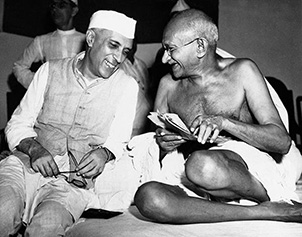Gandhi's Letter
-BY M.K. GANDHI
YOUNG INDIA
| |
 |
| |
Mahatma Gandhi |
Gandhi has sent a long letter this week to the Navajivan. It contains in full his lecture at the Khilafat Conference of which he had supplied only a summary to the Associated Press. Two points not dealt with in detail in the English summary may here be noted, he said:- “Asafali, the Secretary of the Conference, has intimated in the papers circulated by him that the Goraksha problem and the Punjab matter will also be considered.
I submit that the Hindus may not open the Goraksha question here. The test of friendship is assistance in adversity, and that too unconditional assistance. Cooperation that needs consideration is a commercial contract and not friendship. Conditional cooperation is like adulterated coment which does not bind. It is the duty of the Hindus, if they see the justice of the Mahomedan cause, to render cooperation.
If the Mahomadans feel themselves bound in honour to spare the Hindus feelings and to stop cowkilling they may do so, no matter whether the Hindus cooperate with them or no. Though therefore I yield to no Hindu in my worship of the cow, I do not want to make the stopping of cow killing a condition precedent to co-operation. Unconditional co-operation means the protection of the cow.
As regards the Punjab matter too I venture to differ from many of you. I have probed deeply into the Punjab wounds. They may have deeply distressed others. I will not however say that they can distress any one more deeply than they do me, and yet I think that we cannot bring in here the Punjab grievance. However grievous the wrong done in the Punjab I think we cannot abstain from the Imperial Celeberations on that score. We cannot say that the Punjab wrong is unredressed to justify our abstention. For we still expect redress.
The Hunter Committee is still at work. Our own Committee is equally busy. Only if we are dissatisfied or suspicious about a matter directly arising out of the peace terms, can we decide upon abstention. Such a one is only the Khilafat question. It arises out of the Khilafat question and not only are we in the dark about it but we fully apprehend that it may not be settled to our satisfaction.
We shall be accused of having been thoughtless and without sense of proportion if we bring in the Punjab to justify abstention, and it will damage both the Khilafat and the Punjab question. The Khilafat question is a very serious one, and needs immediate remedies. We must isolate it if we wish to give to it its proper place and value.”
“Moulana Abdul Bari Sakeb in proposing a vote of thanks to the chair said; ‘Mahatma Gandhi may say anything as regards the bringing in of the Goraksha question. That does credit to him and to our Hindu brethren. But the Musalman’s Khandani would be at stake if they forgot the cooperation of the Hindus. I for my part will say that we should stop cowkilling, irrespective of their cooperation,because we are children of the same soil.
As a Moulvi I say that in voluntarily stopping cowkilling we shall not offend against the canons of our religion. Nothing has so helped the Hindu-Moslem unity as the Hindu’s cooperation with us in the question of Khilafat.’ The whole meeting greeted the words with ‘Amen’.”
The following account given by Gandhi of a Kasur incident fully corroborates the account given by a coorespondent to the “Tribune” and printed elsewhere: “I had received a telegram from Kasur that a Musalman was severely beaten by the Sub Divisional officer there, for a Khilafat placard stuck on his wall, The man had not stuck the placard at all, and it was harmless. I thought this was a serious affair. That British officers should take the law in their own hands and commit,a criminal offence, should be intolerable.
I therefore visited Kasur in company with Dr. Parasram and took the statements of two Musalmans who were beaten by the Sub Divisional officer. In the meantime I received a note from Marsden, the S.D.O. asking me to see him. He said in the course of his conversation that he had apologised to the Musalman and paid Rs. 10 to him as compensation. I told him that he should apologise publicly.
He agreed to my publicly expressing his regret. The notices were also restored on the wall, Just after this visit I had to address a big public meeting attended by about three thousand men and women. I expressed to them Marsden’s unconditional regret and the people were greatly satisfied.”
Gandhi also refers to a visit to Vazirabad where the people were so very much fear-stricken that they would not even accommodate him and his friends and they had at last to put up in a SHIKH temple. There was a surprise in store for him, he says, at Nizama bad, a small village over fifty miles from Lahore, where an industrious population of blacksmiths manufacture cutlery which is reputed to be the best in India, beautiful handles for sticks and fine rifles. He was very sorry that fine craftsmanship lay thus hidden and unknown in distant villages and that even he with his deep interest in Swadeshi did not know of this village.
Copyright 2019, www.youngindia.co.in. All rights reserved.
|